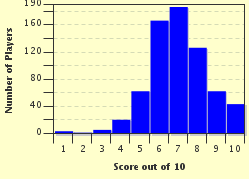Quiz Answer Key and Fun Facts
1. Rain, hail, and snow are all types of this. What am I talking about?
2. What is the weather term used to describe when there is water vapor in the air?
3. The mesosphere extends from around 50 to 90 km above the Earth.
4. How is dew formed?
5. What provides energy to the Earth?
6. Which of the following is a reason why you get colder as you go higher up in the atmosphere?
7. In what layer of the atmosphere does weather occur?
8. What is the most common gas in dry air on Earth?
9. The thermosphere is divided into two sections. They are called the ionosphere and exosphere.
10. Stratus clouds are always thin and wispy and fade as they spread.
Source: Author
baseball2k8
This quiz was reviewed by FunTrivia editor
NatalieW before going online.
Any errors found in FunTrivia content are routinely corrected through our feedback system.


